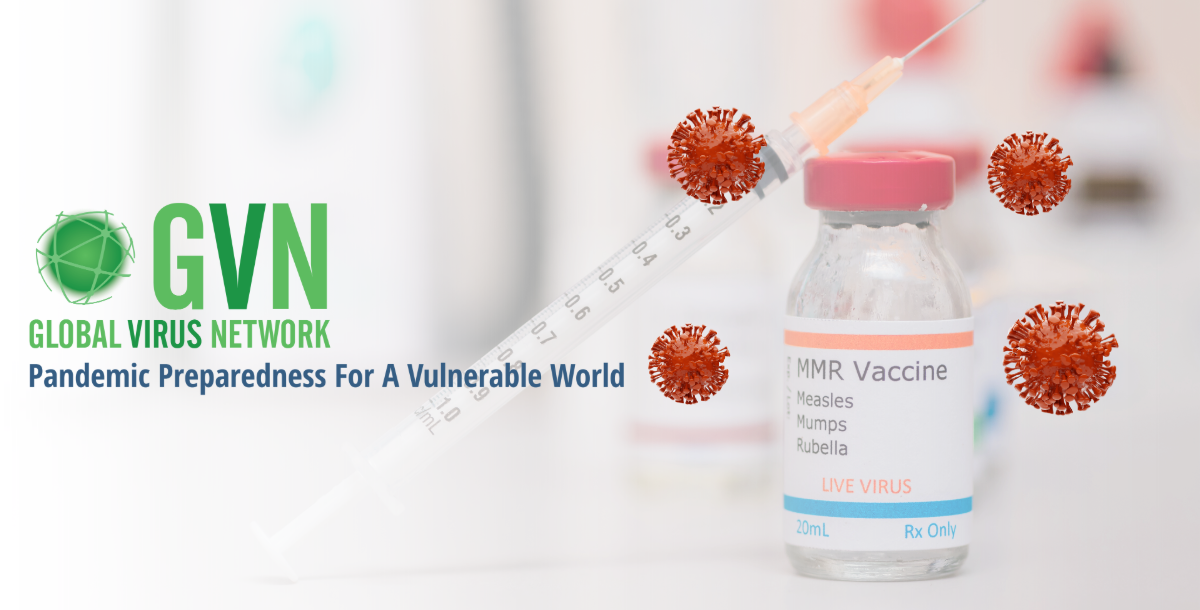A Statement from the Global Virus Network (GVN) on the Rapidly Escalating Measles Crisis in the U.S. and Worldwide

GVN Urges Immediate Action to Reverse Declining Immunization Rates Amid Largest U.S. Measles Surge in Decades
Tampa, FL, USA, July 16, 2025 – The Global Virus Network (GVN), a coalition of leading human and animal virologists from 80+ Centers of Excellence and Affiliates in more than 40 countries, is sounding the alarm over a sharp resurgence of measles cases in the United States and globally. This resurgence, fueled by falling vaccination rates, threatens to erode decades of public health progress.
Measles is one of the most contagious viruses known to humans and is entirely preventable through routine vaccination. The U.S. is now experiencing its highest number of measles cases in over 30 years, with nearly 1300 confirmed cases reported across nearly 40 states in 2025 alone. A recent outbreak in Texas, its largest since the 1990s, has resulted in the death of two children and hundreds of cases concentrated in areas with low vaccine coverage, such as Gaines County. According to publicly available data, the percentage of K–12 students in Gaines County with a conscientious exemption to at least one vaccine has generally increased over the past decade, rising from 4.83% in the 2015–2016 school year to 14.54% in 2024–2025. While some fluctuations in the percentages were reported, the overall trend shows a significant rise, particularly in recent years.
Additional clusters have been confirmed in New Mexico, Kansas, California, Ohio, Pennsylvania, Montana, and Kentucky, among others. These outbreaks underscore how quickly the virus can spread, especially among unvaccinated children. The U.S. Centers for Disease Control and Prevention (CDC) reports that kindergarten vaccination rates have dropped below 93% nationally during the 2023-2024 school year, while nonmedical exemptions have climbed to a record 3.3%. These figures are below the 95% threshold needed for levels of herd immunity to prevent outbreaks.
Globally, measles is surging in Africa, Southeast Asia, and Europe, exacerbated by war, displacement, fragile health systems, and interrupted vaccination campaigns. The World Health Organization (WHO) and the CDC report that over 10.3 million cases occurred worldwide in 2023, up from just 10,000 in 2022, a 30-fold increase.
Half of all large outbreaks occurred in Africa, with significant upswings in Europe, where 41 of 53 countries reported measles cases. The Americas reported an 11-fold increase in early 2025 measles cases, many of them imported by travelers returning from high-incidence regions.
“As global travel rebounds, localized outbreaks can quickly become international threats,” said Robert C. Gallo, MD, chairman of the Scientific Leadership Board and co-founder of the GVN. “This is not just about measles, it’s a warning about what happens when we let our guard down against vaccine-preventable diseases.” Dr. Gallo, who is most widely known for his co-discovery of HIV as the cause of AIDS, is also the James P. Cullison Professor of Medicine and director of the Institute of Translational Virology and Innovation at the University of South Florida Morsani College of Medicine, and director of the Microbial Oncology Program at Tampa General Hospital (TGH) Cancer Institute.
Complications from measles are not rare. In unvaccinated populations, 1 to 3 in 1,000 infected children die, while many more suffer from pneumonia, severe diarrhea, deafness, or encephalitis. Some children go on to develop subacute sclerosing panencephalitis, a deadly neurologic condition that can appear years after infection.
“Every measles outbreak is a failure of public health infrastructure and public trust,” said Scott C. Weaver, MS, PhD, GVN Center of Excellence Director at The University of Texas Medical Branch and Scientific Director of the Galveston National Laboratory. “We cannot afford complacency. The MMR vaccine is safe, effective, and essential to safeguarding our communities, especially the most vulnerable among us.”
The GVN urgently calls for:
- Immediate vaccination of unvaccinated children and adults with the MMR vaccine.
- Stronger public health messaging.
- Improved outbreak surveillance and response systems at local, national, and global levels.
- Focused efforts in underserved and rural communities, where access and hesitancy pose heightened risks.
As a network dedicated to pandemic preparedness, the GVN warns that the erosion of routine immunization not only endangers individual lives but also undermines global capacity to respond to future viral threats.
GVN experts are available for interviews and commentary.
###
About the Global Virus Network (GVN)
The Global Virus Network (GVN) is a worldwide coalition comprising 80+ Virology Centers of Excellence and Affiliates across 40+ countries, whose mission is to facilitate pandemic preparedness against viral pathogens and diseases that threaten public health globally.
GVN advances knowledge of viruses through (i) data-driven research and solutions, (ii) fostering the next generation of virology leaders, and (iii) enhancing global resources for readiness and response to emerging viral threats. GVN provides the essential expertise required to discover and diagnose viruses that threaten public health, understand how such viruses spread illnesses, and facilitate the development of diagnostics, therapies, and treatments to combat them. GVN coordinates and collaborates with local, national, and international scientific institutions and government agencies to provide real-time virus informatics, surveillance, and response resources and strategies. GVN's pandemic preparedness mission is achieved by focusing on Education & Training, Qualitative & Quantitative Research, and Global Health Strategies & Solutions. The GVN is a non-profit 501(c)(3) organization. For more information, please visit www.gvn.org.
Media Contact:
Nora Samaranayake
[email protected]
